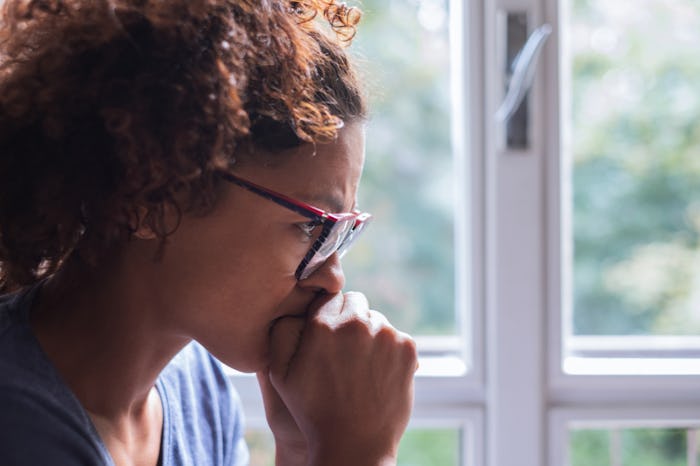Life

Sure, Ovulation Can Make You Feel Icky, But It Could Also Make You Feel *Great*
It's common to experience mood fluctuations around the time of your period. Hello, PMS. But if you feel like you're on a bit of a emotional rollercoaster in the middle of your cycle, it's easy to wonder if ovulation can affect mood too. If mittelschmerz is the term for mid-cylcle pain, is there such thing as emotional mittelschmerz?
It turns out that, yes, ovulation can be another time during your monthly cycle when hormones can impact your physical and emotional state. "[During ovulation], the physical symptoms can be breast tenderness, bloating, mittelschmerz pain (pain on one side of the abdominal area), and more abundant cervical mucus," explains acupuncturist Dr. Angela Le, DACM, LAc, a leading integrative reproductive health expert and founder of Fifth Avenue Fertility Wellness in New York City, speaking with Romper. And on the emotional front, during this transition time in a cycle, there's always opportunities for fluxes and changes in mood, Le notes. OB-GYN Dr. Navya Mysore told Bustle, in fact, that she sees a lot of patients who experience mood fluctuations mid-cycle, and PDMM (Premenstrual Dysphoric Disorder) is sometimes the cause.
Those mid-cycle hormone shifts might have you feeling everything from irritable to lusty to energetic. "Around the time of ovulation, if a woman feels particularly moody we can usually attribute this to the rise in estrogen that occurs right before the LH (luteal hormone) surge that enables her to release a mature egg ready for conception," explains Kristen Burris, LAc., M.S.T.O.M., Licensed Acupuncturist and Master Traditional Chinese Herbalist, in an interview with Romper. "[And] each woman has different experiences with their libido during ovulation. Some women report they actually feel more turned on and even find their partner more attractive during ovulation."
If you feel like you have an extra spring in your step in the middle of your cycle, that too can be chalked up to ovulation. "A lot of women don't really experience mood shifts. They experience more energy and positivity," according to Dr. Le. In fact, a study conducted in Spain revealed that women who were not on birth control — and thus experiencing all-natural, hormonally charged cycles — experienced more positive emotions during ovulation than those who were on some form of contraceptive, reported Health.
Of course, if you're trying to conceive, ovulation can take on a whole new level of significance. "I would say that for women going through fertility, it can be a very hopeful, exciting time: 'Maybe this will be the month,' says Dr. Le.
Yet, if a woman is struggling with infertility, ovulation can also be a stressful time, one that is only amplified by fertility drugs. "If a woman is going through IVF and taking a lot of fertility medications, and she's getting ready for a retrieval or insemination, then there's a potential for way more bloat, much higher level of hormones, maybe feeling more moody or hungry; maybe craving sweets," according to Dr. Le.
Whether you're trying to conceive or not, ovulation symptoms can be disruptive, especially if you find yourself weepy or angsty at inopportune times. If that's the case, Dr. Le recommends meditation. "Emotions are communicating to us. We just don't understand the language because no one teaches us. I teach women. If you can mediate or have a mindfulness practice, or breath work practice, that can be really helpful," says Dr. Le.
Women might also find relief with acupuncture. "Within three months we typically can balance hormones, regulate the Traditional Chinese medical pattern and disharmony that is causing the emotional imbalance. Exercise, massage, and guided meditation to treat anxiety or depression too can help calm women during this time as well," explains Burris.
The most important thing to remember is that we're all different."There are no typical reactions during ovulation," says Burris. Paying attention to how you are feeling mid-cycle, and having what Dr. Le calls "body literacy," is what matters.
This article was originally published on